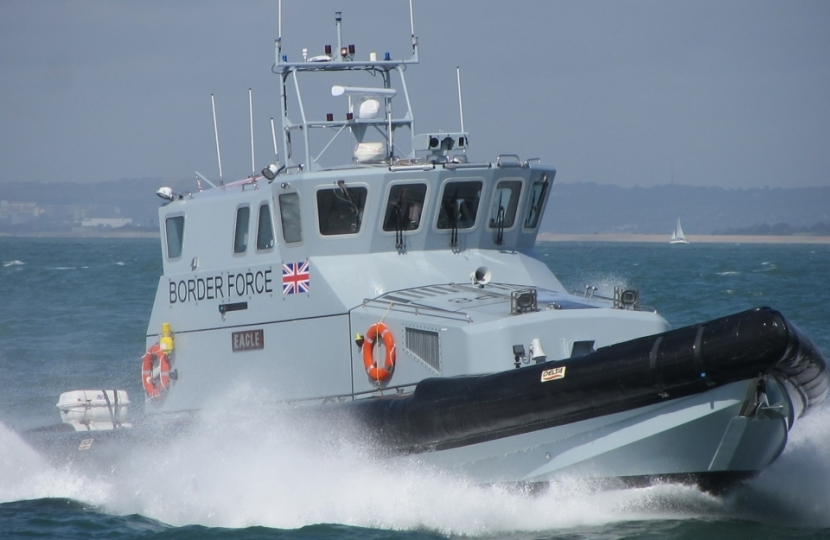
Since 2018, around 100,000 people have illegally entered the UK by small boat – around 46,000 of them in 2022 alone. All travelled through safe countries in which they could and should have claimed asylum. We have a duty to house them and the bill for hotel rooms has now reached £7 million a day.
The volume of illegal small boat arrivals has simply overwhelmed our asylum system. The legacy of asylum claims has risen to over 170,000 people with the asylum system now costing the British taxpayer £3.6 billion a year. That is unsustainable.
Aside from the huge cost to the British taxpayer, the risk remains that these individuals just disappear. When we try to remove those whose claims are dismissed, they turn our generous modern slavery laws against us to prevent removal. We will only break the business model of the criminal gangs exploiting vulnerable people and deter illegal migrants if it is abundantly clear that the only outcome of illegal entry is not a new life in the UK but their swift removal either to their home country or a safe third country.
The need for reform has been obvious and urgent. The small boats problem is part of a larger global migration crisis, but one that this Government is committed to tackling, including with international partners.
On 20 July, the Illegal Migration Bill, now the Illegal Migration Act, received Royal Assent and became law. The Illegal Migration Act makes it unambiguously clear that all illegal migrants who do not have a right to come to the UK will be removed to their home country or a safe third country, wherever viable. The new laws ensure that if you enter the UK illegally:
- the Home Secretary will be under a new duty to remove you;
- you may be detained, with no recourse to immigration bail or judicial review, within the first 28 days, or eight days for unaccompanied children where they are detained for the purpose of removal. We can maintain detention thereafter so long as we have a reasonable prospect of removal;
- the number of appeals and challenges available to suspend removal will be radically narrowed. Only those at real risk of serious and irreversible harm in the country we are removing them to or who claim that they do not meet the removal conditions, will be able to delay their removal. Anyone under 18 will only be removed in limited circumstances ahead of them reaching adulthood, such as for the purposes of reunion with a parent, where removal is to a safe country of origin, where the person has not made a protection claim or human rights claim, or in other circumstances specified in regulations made by the Secretary of State;
- other human rights claims, including the right to private or family life, or other forms of Judicial Review cannot suspend your removal. They will be heard remotely, after removal;
- you will be disqualified from using modern slavery rules to prevent removal. If someone is identified as a potential victim of modern slavery, we will ensure they are safely returned home from where they were removed against their will, or to another safe country. Removal from the UK may only be deferred where a person is co-operating with law enforcement agencies in an investigation into the circumstances of their trafficking. This will mean that genuine victims are protected, while preventing people from abusing our modern slavery laws to thwart their removal from the UK;
- you will face a permanent bar on lawful re-entry to the UK and a permanent bar from securing settlement in the UK or from securing British citizenship through naturalisation or registration, subject only to very narrow exceptions.
It is important that we do not incentivise people smuggling gangs to target particular groups or those with certain characteristics. Therefore, families and children who come to the UK illegally will not be exempt from detention and removal under this legislation. The welfare of those who are detained is of the utmost importance; we will only detain families and children when it is necessary and in appropriate accommodation with appropriate healthcare provisions.
The Act does not prevent someone from claiming asylum. However, if individuals come to the UK illegally, and have not come from a country where their life and liberty were at risk, their asylum and human rights claims against their country of origin will be declared inadmissible. They may be detained, and will be removed either to their home country (if it is safe to do so), or relocated to a safe third country, where they will receive support to rebuild their lives. They will not be able to make a life here in the UK.
As we reduce illegal migration, we will do more to help the most vulnerable who are at risk of war and persecution through safe and legal routes. Between 2015 and March 2023, the UK has offered safety to over half a million people from all over the world, using our global resettlement schemes as well as our country-specific routes for Syria, Afghanistan, Hong Kong and Ukraine. Our resettlement and relocation programmes, alongside a fair and firm asylum system, will ensure we continue to offer safe and legal routes to the UK for those in need of protection, including children and families.
The UK’s refugee resettlement schemes include the UK Resettlement Scheme (UKRS), Mandate Resettlement Scheme, Community Sponsorship and the Afghan Citizens Resettlement Scheme. The UK works closely with the United Nations High Commissioner for Refugees (UNHCR) to receive referrals under these schemes with referrals based on an assessment of protection needs and vulnerabilities, in line with their resettlement submission criteria which specifically includes children and adolescents at risk. The vast majority of children resettled through the UKRS will arrive with their parents or other carers. However, the UNHCR will always seek to find local solutions and reunify unaccompanied children with parents or family members within the region or wherever those family members may be. It is often in the child’s best interest to remain in the region where they are more likely to be reunited with family. However, unaccompanied children are eligible under the scheme if the UNHCR determines that resettlement is in their best interests. Our focus remains on helping people directly from regions of conflict and instability.
Through the Illegal Migration Act, we will introduce an annual cap, to be determined by Parliament, on the number of refugees the UK will accept, once illegal migration is under control. This will allow us to plan for an orderly system, in conjunction with local authorities, that takes into consideration local capacity for accommodation, public services and support. This will help avoid a repeat of the use of hotels to accommodate people. The only way to come to the UK for protection should be through safe and legal routes. This will take power out of the hands of the criminal gangs and protect vulnerable people, including children.
The UK has a proud history of providing protection to those who need it. However, in the face of today’s global migration crisis, our previous asylum laws are being systematically abused and are simply not fit for purpose. With 100 million people displaced around the world, our compassion to help may be infinite, but our capacity to do so is not.
The British people are, above all else, fair. It is this sense of fairness that is so affronted by the queue jumping, the gaming of our system, and the flagrant law breaking in the small boats crisis. The British people are also patient. But their patience has run out and these new laws mark a vital step towards stopping dangerous, unnecessary and illegal journeys to the UK, and removing the incentive for people to take these routes in the first place.

